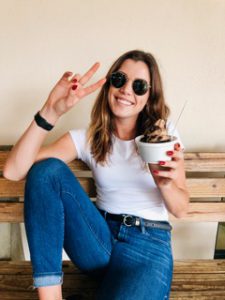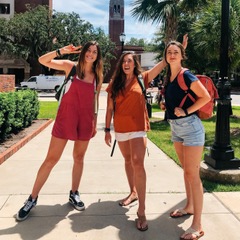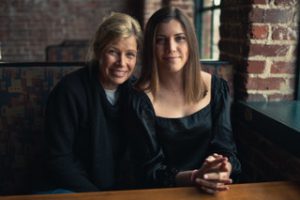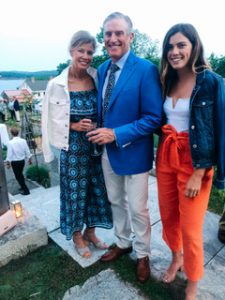 We are pleased to welcome Hannah Cooper to the Discover FSHN Series! Hannah is an alumna of the FSHN MS/DI program, and she is here to share her story, from her inspiration to study dietetics while living in Japan to her journey into nutrition private practice. Read on to learn about her path to UF, her plans for her career, and one of the most unusual foods she’s ever eaten!
We are pleased to welcome Hannah Cooper to the Discover FSHN Series! Hannah is an alumna of the FSHN MS/DI program, and she is here to share her story, from her inspiration to study dietetics while living in Japan to her journey into nutrition private practice. Read on to learn about her path to UF, her plans for her career, and one of the most unusual foods she’s ever eaten!
You graduated from the FSHN MS/DI program in August, and now you run your own business! Please tell me about your work—how did you get started? What do you do on a day-to-day basis?

As soon as I passed the RD exam I launched my private nutrition consulting practice, Hannah Cooper Nutrition Consulting, LLC! During my dietetic internship (DI), I was fortunate enough to work for a private practice dietitian in Houston and I’ve been hooked on private practice ever since! I wanted to help make a difference in people’s lives and motivate people to reach their nutrition and health goals, and the perfect sector of nutrition for me to do that was private practice. So far, I have really enjoyed working one-on-one with my clients.
In addition to my private practice, I also work for a nutrition company in San Diego as their Dietetics Relations Coordinator. What I love about this job is that I get to help come up with new products, market our current products, and work with dietitians across the US who use our products for research.
Tell me about your path to dietetics.

My mom is also a registered dietitian, so I grew up learning about nutrition, cooking, and how to eat healthily–except the one thing my mom always made me for lunch was a peanut butter and Nutella sandwich. I guess it is all about balance, right?
During high school, I was put on a very restrictive diet because I was having some digestive issues. I was dairy-, gluten-, soy-, peanut-, and egg-free (or as I call it, fun-free). Finding foods to eat was really difficult, especially as we were living abroad in Japan, so I started spending more time in the kitchen making foods that tasted good and fit my diet. During this time I started my blog, Hannah’s Gluten-Free Adventure. It was my way to share my journey, struggles, and recipes with those who were also struggling with the same food issues.
As I began to reincorporate everything that was restricted, my blog transformed into the CalifoodieLifestyle (during my time in California) and now EatWellWithHannah. Although I do not blog anymore, I still use my platform in the same way through sharing healthy recipes, hacks, tips, and educational bits in hopes of connecting with people all over the world. I’ve been able to meet so many young creatives through Instagram and even mentor some high school students and RD2BEs who want to become dietitians!
Would you share how you chose the MS/DI program at UF?

During my senior year at Pepperdine University, my DPD director told me I needed to challenge myself during my DI and that UF had a really strong and well-known program. The thing that pulled me to UF was the combined MS/DI program. I figured it was beneficial to get a Master’s degree now rather than going back to school later.
What are your plans for your practice/career?
Ultimately, I want to have a successful private practice while also having a popular social media page (and maybe even TV segment/show). I would love to become a major nutrition influencer on social media, like Rachael’s Good Eats and Abbey’s Kitchen! I love filming videos about nutrition and making fun recipes and reels on Instagram, so I feel like it would be a career I would never get bored of.
What do you like to do in your free time?

In my free time, I like to cook and manage my food on Instagram (@eatwellwithhannah). I use this platform to educate young adults about healthy recipe options, grocery store tips and tricks, and some easy nutrition information. I also love making Instagram reels that challenge diet culture and nutrition misinformation! When I am not working on that, I love playing tennis and going out for long runs along the Houston Bayous.
What’s the strangest food you’ve ever eaten, and how did you come across it?

One of the strangest things I’ve eaten is a kuro-tamago (black egg) in Hakone, Japan. Located in Hakone is the “Great Boiling Valley”, a volcanic basin that erupted almost 3000 years ago. What remains is a crater filled with hot springs and sulfur vents–you can imagine it does not smell great. Locals take regular eggs and cook them in the hot springs, as you would hard boiled eggs. But these eggs turn black because of the sulfur levels in the water. According to locals, eating one black egg will add seven years to your life. I think I have racked up 14-21 years from all the times I’ve visited.
Note: Some images in this post were taken prior to national guidelines of face coverings and social distancing.
Interested in learning more about FSHN’s Dietetics programs? Read more here and here!
P.S. The Discover FSHN Series highlights the unique experiences of UF’s Food Science and Human Nutrition students, faculty, staff, and alumni. Want to read more about the amazing work going on in the FSHN department? See our previous features below:
Undergraduate Students:
Shannon Mai, Dietetics
Alex Colon, Dietetics and Jenny Duong, Food Science
Jackie Shannon, Nutritional Sciences
Jennifer Jordan, Food Science
Lily Tucciarone, Dietetics
Graduate Students:
Savanna Curtis, Food Science (M.S.)
Carley Rusch and Matthew Beke, Nutritional Sciences (Ph.D.)
Alexa Hosey, Dietetics (MS/DI)
Vicnie Leandre, Food Science (M.S.)
Rufus Theophilus, Nutritional Sciences (Ph.D.)
Faculty:
Dr. Naim Montazeri, Food Science/Food Virology
Dr. Jeanette Andrade, Dietetics
Dr. Zhiyong Cheng, Nutritional Sciences
Dr. Juan Andrade Laborde, Global Nutrition
Dr. Razieh Farzad, Food Science
Staff:
Sharyn Passeretti, Lab Specialist
Herschel Johnson, Manager of Student Services
Alumni:
Becca Solch, Nutritional Sciences, Postdoctoral Research
P.P.S. Learn more about FSHN’s renowned programs below!
Undergraduate Programs:
Dietetics
Food Science
Nutritional Sciences
Graduate Programs:
M.S. Dietetic Internship Program
M.S. Food Science and Human Nutrition
Ph.D. Food Science
Ph.D. Nutritional Sciences
 0
0
